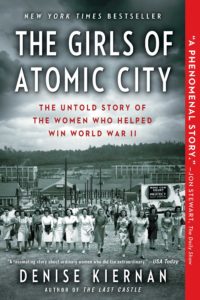By Sara Z. Kutchesfahani
 With summer now officially over and schools back in session, in the spirit of combatting the marticle (articles/reports only quoting men as sources), I have compiled a list of four must-reads for anyone interested in nuclear weapons/non-proliferation/security issues, written by five women. These pieces cover the intricacies of nuclear weapons; gender issues in the field of nuclear policy; arms control; and nuclear security, and span our nuclear history, starting from the important role women played in the Manhattan Project and ending with a pressing contemporary nuclear concern: cybersecurity.
With summer now officially over and schools back in session, in the spirit of combatting the marticle (articles/reports only quoting men as sources), I have compiled a list of four must-reads for anyone interested in nuclear weapons/non-proliferation/security issues, written by five women. These pieces cover the intricacies of nuclear weapons; gender issues in the field of nuclear policy; arms control; and nuclear security, and span our nuclear history, starting from the important role women played in the Manhattan Project and ending with a pressing contemporary nuclear concern: cybersecurity.
Denise Kiernan, The Girls of Atomic City: The Untold Story of the Women Who Helped Win World War II (New York: Touchstone, 2014)
Not the best subtitle, but this incredibly readable book tells the remarkable true story of the top-secret town of Oak Ridge, Tennessee, and the young women who were brought there to unknowingly help build the atomic bomb. Oak Ridge was shrouded in such secrecy that it did not appear on any map. Young women from small towns across the United States were recruited with the promise of a good wage and work that would end the war, but without knowing what they were actually doing there. It was not until the end of the war when Oak Ridge’s secret was revealed and the women learned how they had contributed to the war effort.
Carol Cohn, “Sex and Death in the Rational World of Defense Intellectuals,” Signs 12:4 (Summer, 1987): 687-718
Probably on almost all International Relations (IR) and/or Feminism class syllabi across the country and the Atlantic, Carol Cohn’s timeless article analyzes the boundary between the expert discussions of (mainly male) “defense intellectuals” and the non-expert language used by the general public. Her research is based on a year’s worth of participant observation among researchers working at a male-dominated university center on defense technology and arms control, where she attended lectures and meetings, and conducted interviews. During her time, she realized that in order to be taken seriously within the defense community, she needed to be able to communicate in “technostrategic” language — the language of her interlocutors. The key stand-out line in Cohn’s piece is her description of the technostrategic language and the imagery it evokes. [It] is “abstract, sanitized, full of euphemisms…sexy and fun to use,” while the imagery it evokes “domesticates and deflates the forces of mass destruction…reverses sentient and nonsentient matter…conflates birth and death, destruction and creation — all [of which are] part of what makes it possible to be radically removed from the reality of what one is talking about and from the realities one is creating through the discourse.”
Nancy Gallagher, “Re-thinking the Unthinkable: Arms Control in the Twenty-First Century,” The Nonproliferation Review 22:3 (2015): 469-498
Dr. Gallagher from the Center for International Security Studies at the University of Maryland (CISSM) offers a novel and productive way of thinking about the political and technical dimensions of arms control in the 21st Century: that of “Cooperative Security.” In brief, the “Cooperative Security” model reminds us that globalization changes the nature of security problems in ways that “require and facilitate closer cooperation among stakeholders than has ever occurred before, including with historical adversaries and non-state actors.” In this paper, Gallagher outlines how the cooperative security approach can rejuvenate interest in formal arms control and make international dialogues and negotiations more constructive.
Beyza Unal and Patricia Lewis, “Cybersecurity of Nuclear Weapons Systems: Threats, Vulnerabilities, and Consequences” (Chatham House, 2018)
Based in London, Drs. Unal and Lewis are two out of a handful of women worldwide working on the complexities of how cybersecurity relates to nuclear security. In their latest piece, they describe how cyber vulnerabilities within nuclear weapons systems present a set of dangers and risks. Moreover, while they recognize that nuclear weapon states are unlikely to share the cyber vulnerabilities of their nuclear weapon systems, they impress upon academics, think tanks, and NGOs to press for information and reassurances from governments that these issues are being addressed. As they conclude, almost ominously, “it is the public that pay[s] the ultimate price for complacency regarding cybersecurity of nuclear weapons systems.”
Of course there are many other brilliant women writing in this field, but this list can start the conversation and, hopefully, inspire others to add their own suggestions. Women’s voices in this field need to be heard more and are critical to the broader nuclear debate.
Kutchesfahani is the Senior Policy Analyst at the Center for Arms Control and Nonproliferation and is herself a woman who has authored books on nuclear issues. Her first book, Politics and the Bomb: The Role of Experts in the Creation of Cooperative Nuclear Non-Proliferation Agreements, was released in 2014. Her second book, Global Nuclear Order, is expected November 2018.
